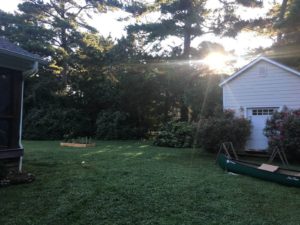 Not In My Backyard, not through the oak trees and my childhood playground, not through my favorite fig tree that produces fruit in August, not through the grass that stains my jeans and welcomes my wild running feet, and not through my neighbor’s either. Nimbyism, Not In My Backyard; defined as a term for someone who resists unwanted development in his or her neighborhood or town.
Not In My Backyard, not through the oak trees and my childhood playground, not through my favorite fig tree that produces fruit in August, not through the grass that stains my jeans and welcomes my wild running feet, and not through my neighbor’s either. Nimbyism, Not In My Backyard; defined as a term for someone who resists unwanted development in his or her neighborhood or town.
I am a white woman of English and Greek heritage. When I am not in school, I live with my family in an upper class neighborhood that runs along the Chesapeake Bay in Virginia Beach, Virginia. I have a voice, and I believe that voice comes from my race, it comes from my privilege, and it comes from my family’s economic status. I think that this voice that I have been gifted bestows a duty upon me to speak for and with communities and individuals to whom our society does not allow a voice.
While biking through the hot and hilly roads of Montana the following questions have emerged: If I don’t want development in my own backyard, where does this proposed development get transferred to? What do the communities look like that cannot afford to deny the economy of a possible copper mine or fracking site? What types of communities will be left desolate and empty handed when the earth is dry and the industry has deserted them?
I hear a lot of people say “Not in my backyard,” and I must ask what constitutes as “my,” where is “your backyard,” and why not there? For many recreationalists, both native to Montana and other states, one of their treasured “backyards” is the Smith River. The Smith is a tributary of the Missouri that flows between the Little and Big Belt Mountains near the town of White Sulphur Springs. It is such a special river that you have to enter a lottery system in order to have a chance to float down the 59 mile stretch of beauty. However, the proposed Black Butte Copper Project is perceived by recreationalists and lovers of the river to pose a threat to the well-being and resiliency of the Smith.
While we were in White Sulphur Springs, it was quite apparent that many locals and businesses supported the mine. The mine could provide them a boost in economy that they haven’t seen since the timber industry in the 1980s. The plywood boards could be stripped from the boarded up store windows and new businesses could flourish, shop owners could see more profit from the copper mine employees and their families, and the town could be lively again. I think many residents see hope in this project for all of these reasons. There is also a large amount of opposition from the lucky crew of people who marvel at the Smith’s beauty and are able to float down it. Some of these people may be locals, but those that aren’t have a more difficult time seeing how this mine could help an economically struggling town. They have the ability to move on if the Smith is damaged, and their lives are not at the forefront.
Whether or not to support this project is a tough choice, but for some it isn’t seen as a choice. It is seen as an economic opportunity that can’t be passed up. For towns of such low economic status, the long term environmental impacts of the mine aren’t of much value because the primary economic impact is often too good to look past, and I think this is where most local support stems from. The copper mine is projected to bring in $400 million dollars in county, state, and federal taxes; $3 million will come from Meagher County alone. The average wage of workers is expected to be $65,000 each year, and the operation will employ 240 full time workers.
This theme of privilege of choice is also very prominent in the climate change revolution. It is clear that there are communities that simply cannot focus on the current issues of the climate, but this doesn’t mean that they do not want to. Some communities may be in such economic and social stress that they can’t choose between solar and gas. This is where the privileged voices come into play, we who have the ability to choose a better environmental path must lead the market for those who can’t; I think it is our moral obligation to do so. It is important to be aware of the social and economic injustices that are associated with climate change. It is easy to see this issue as strictly environmental, but those who are wholeheartedly searching for solutions know that this isn’t the case. Not until we can work together as a supportive and justice based community, large-scale systemic change will be very difficult to achieve.
2 Replies to “Chloe Williamson: The Privilege of Choice”
Comments are closed.
Excellent work, Chloe. Can I forward to my friends at Riverkeepers?
Way to go Chloe! Well said!!!
AC